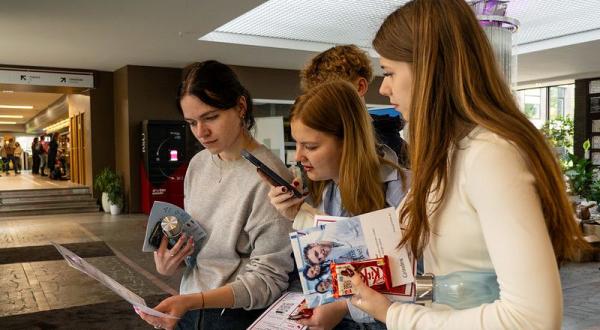Toms Baumanis, RSU Vice-Rector for Administration and Development, Urges Us to Stay Connected
The COVID-19 pandemic has been a catalyst for universities to work online and make use of the latest digital platforms.
The novel coronavirus has been challenging for everyone: for businesses, for the state and for individuals. It has made us look back and evaluate the way we live and work. “Digital” and “online” have become important keywords. In the past, many universities might have not paid much attention to digital solutions, yet, following the events of 12 March things changed and being able to work online became a matter of survival for many universities. Universities now had to rely on digital solutions to carry on their work and ensure the continuity of day-to-day communication and the study process. It was the time to demonstrate one's abilities. Hashtags such as #workfromhome and #universityathome appeared on social networks worldwide.
Higher education and science were challenged from many directions simultaneously: scientists were actively involved in researching the new virus and universities created new crisis management plans and new internal guidelines. More significantly, however, the new virus influenced the study process, which had to be transferred online prompting various online communication and learning platforms to be created. Universities that had followed global trends and invested time, effort and finances into digital solutions long before the pandemic were in a more advantageous position. Thus, the study process came to a halt at some universities, but continued at others. Many universities are still struggling.
I can clearly recall Wednesday, 11 March, the day before the national state of emergency was declared in Latvia. In anticipation of events, Rīga Stradiņš University (RSU) had already switched to remote studies, and 9,300 students were now studying online. The number of activities online tripled, and, most importantly, the study process never stopped, not even for a single day. Since mid-March more than 25,000 sessions (or 17m minutes) have been conducted over Zoom alone, connecting thousands of RSU students and lecturers from different countries: Latvia, Germany, Sweden, Norway, Italy, USA, Israel, Portugal, etc.
RSU has the largest international student community in Latvia – 2,503 students from 58 countries, to be exact. Unsure of what to expect, some international students left Latvia in March and went back to their home countries. A large proportion of students volunteered to help healthcare practitioners. Anyone who can do a simple calculation can understand what it means for a business to lose half of its customers. To our great satisfaction, only very few students left their studies at RSU. What does that suggest? Firstly, that Latvia has proven its education export capacity and gained the approval of international students and their parents. Secondly, we live in a so called “global village”, so digitalisation was a visionary step. By this I do not mean Zoom alone, but a range of other platforms as well that are used to ensure the study process. The RSU digital library of educational materials has a collection of more than 14,000 video files that are used by our lecturers in their courses. We are very content that there was no need to extend the academic year, as we managed to implement a system for remote examinations.
Despite the prevailing uncertainty, this year 401 international students chose to study at RSU. The number of applicants for studies at Latvian universities, including RSU, is the highest it has been in recent years. At RSU, not only the state-funded scholarship places have been filled, but also study places requiring a tuition fee. As a result of the crisis we now see education as a long-term investment, and it is never too late to invest in education. Many of you might have heard the story of the 96-year-old Italian man who fulfilled his dream and obtained a higher education – similarly, this summer a 67-year-old woman graduated from the RSU Faculty of Law.
To be fair, I have to admit that digital solutions cannot replace everything. Regular in-person studies are still a very important. Technologies cannot substitute human contact and interaction. Then again, the investments we had made in developing our online environment over the last few years has helped us stay connected during the crisis.
As a result of the pandemic universities were forced to implement changes that were expected from them by all interested parties much faster, and introduce the latest online technologies, digitise the study process, while at the same time preserving academic traditions and keeping the irreplaceable human factor in education: regular in-person lectures, classes and discussions. Universities take pride in their traditions, but COVID-19 forced many out of their comfort zone and made us search for state-of-the-art technologies to be able to provide the study process and support research.
The European University Association has said that
‘As places that gather many people, universities are emptier now than before, but this does not mean that they are closed. Learning and teaching are very active online and universities remain central in the research of new treatments and possible vaccines. The crisis has opened a window of opportunity for universities to engage even more with society, support governments through research and innovation and to help prepare a more resilient society.’
Another period of working in uncertain times still lies ahead, but now we are more prepared to face it. The world's leading universities, such as the University of Cambridge and Stanford University, have announced that they will be holding online lectures for most of the year. And they are not the only ones. Others are looking into blended learning solutions. And so is RSU. We see that the higher education that we provide is appreciated in many countries, so education as an export should be further strengthened. We are fortunate because Latvia still remains among the safest countries in the world and among the countries with the fastest internet speed, which we make use of in the study process and in research.
In Latvia, the contribution of higher education export to the economy is not recognised as an economic factor, as a large part of the representatives of the higher education sector and policy makers do not want to think in terms of market economy categories. RSU alone, not to mention RTU or LU, contributes at least 90m euros a year to Latvia's GDP. This has a positive effect on the country's overall services balance. By multiplying the annual contribution by the five or six study years of each student, we can see how great the added value of one international student is.
RSU aims to continue to increase its digital capacities and competences, however, it is not possible to study healthcare or medicine without seeing patients. We can only hope that it will remain possible for students to see patients at Riga East University Hospital, Pauls Stradiņš Clinical University Hospital and the Children's Clinical University Hospital. Hopefully, student-patient interactions will not be prohibited or reduced. It is not common practice in Switzerland, Germany or other European country. We cannot lose the connection between the university and major clinical university hospitals, or the connection between a student, professor and patient.





